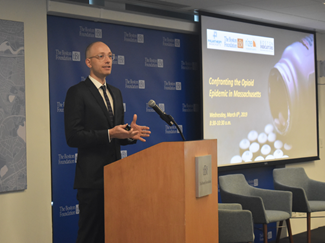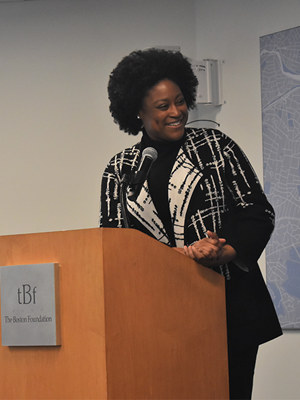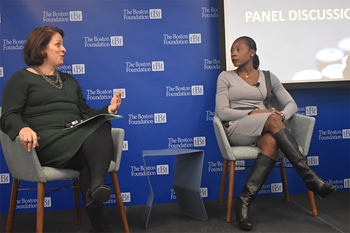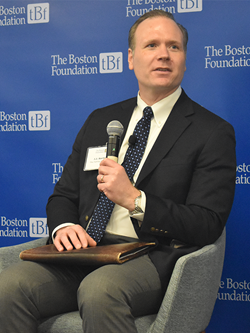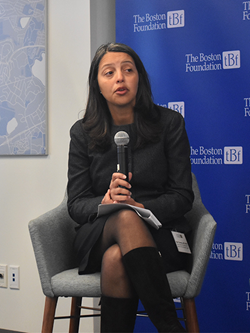Confronting the Opioid Crisis in Massachusetts
Funders, practitioners meet to gain perspective on the crisis
March 6, 2019
When Dr. Myechia Minter-Jordan asked the gathering of people at the Edgerley Center for Civic Leadership if any had been affected in some way by the current opioid crisis, almost every hand in the room went up.
On March 6, funders, practitioners and other community leaders met for “Confronting the Opioid Epidemic in Massachusetts,” with two brief research presentations and two moderated panels. After an introduction by the Boston Foundation’s Vice President of Programs Orlando Watkins, Minter-Jordan, a physician who is President and CEO of The Dimock Center as well as a member of the Boston Foundation Board of Directors, brought the reality of the crisis right into the room. As the forest of hands went down, she introduced Luc Schuster of Boston Indicators and Andy Bagley of the Massachusetts Taxpayers Foundation, who each shared some key findings that further put the situation in perspective.
Nationwide, there were more opioid-related deaths than automobile fatalities in 2017, a number that exceeds total American deaths in the Vietnam War and the number of U.S. HIV/AIDS related deaths in 1995, a peak year for that epidemic.
Over the last 10 years or so, the numbers had increased steadily but moderately—until around 2012, when they spiked dramatically upward—both nationwide and in Massachusetts, where deaths exceeded the per capita national rate. The spike correlates directly with the appearance of the synthetic opioid Fentanyl on the market, a drug that has become nearly ubiquitous in all manner of substances.
Death isn’t the only negative outcome of our increasing drug problem, but a succinct measurement of one key indicator of its mercilessness. Indeed, part of Mass Taxpayers' goal was to do a groundbreaking, comprehensive analysis of the economic impact on the Commonwealth and lay out a methodology so that other states could follow suit. They found that absenteeism, “presenteeism” (i.e., being there but being useless for work) and increased health care costs alone add up to well over $5 billion annually.
To discuss the scope of the crisis, Julie Burnes, Executive Director of RIZE Massachusetts, a nonprofit dedicated to ending the opioid epidemic, moderated a conversation with Minter-Jordan and Marty Martinez, Chief of Health and Human Services for the City of Boston. They discussed the medical and public health aspects of Fentanyl, including harm reduction practices, pathways to recovery and the need for bold risk-taking—like the planned bridge to Long Island, which would make the creation of a recovery campus possible—to get past the stigma and attack the disease.
That conversation segued into the second panel, discussing innovative solutions and funding needs. The Foundation’s Director of Health and Wellness Nineequa Blanding posed questions to JJ Bartlett of the Fishing Partnership (an association representing one of the populations hardest-hit by the opioid epidemic); David Barash, Executive Director of the GE Foundation; Brendan Little, Policy Director for the City of Boston’s Office of Recovery Services; and Elsie Taveras, pediatrics professor and Executive Director of the Kraft Center for Community Health at Mass General Hospital. Each of these experts spoke of organizations they support or work with that are pursuing outreach, treatment and support for people suffering or recovering from opioid use disorder—including Boston Health Care for the Homeless, Boston Medical Center, CareZone, the Herren Project, Project Here, RIZE, Shatterproof, SUSTAIN Communities, and more.
There was agreement on several points: harm reduction practices are effective (despite controversy); abstinence should not be a requirement for treatment; stigma must be removed from addressing this disease; no community is spared; and prevention and treatment have to be customized to the community.
All this, and hope is important.
“Being in recovery myself,” shared Brendan Little, “it never ceases to amaze me how much hope can change a life.”

